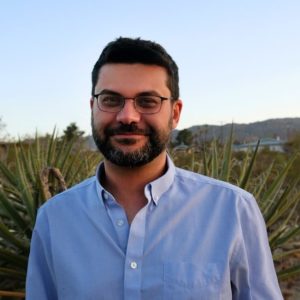Michael Edison Hayden didn’t have any designs on being a reporter, let alone one who spends his time covering hate groups. He started out as an American playwright who was just looking for work while living overseas.

After several years as a de facto correspondent for U.S. papers in India and Nepal, he and his family moved back to the U.S.
The idea of protecting the safety of immigrants and people of color in the United States is of particular importance to him — in addition to his wife being from India, his mother immigrated to the U.S. from Egypt.
He was covering for someone at ABC News when the 2017 Unite the Right rally happened in Charlottesville. He’d covered a similar rally earlier in the year, in the same town, and used his contacts there to report in real time the horrors witnessed by activists who saw James Fields run through an intersection at the city’s downtown mall, killing Heather Heyer.
“I was very upset after Charlottesville,” Hayden says, now an editor at the Southern Poverty Law Center. “I wanted to sharpen the reporting on extremism because I felt they had gotten away with too much in the leadup to that rally. Those dapper white supremacist stories about Richard Spencer.”
With that in mind, Hayden stresses that reporters who want to cover hate groups and white supremacist/nationalist organizations understand what they’re getting into and how to protect themselves while working to report on dangerous people.
“If you want to do it the right way, put a lot of work in,” he says. Coming into a newsroom and accusing someone of being a neo-Nazi isn’t enough to warrant a story. “The more thorough the reporting, the more detail-oriented your report is, the more impactful your reporting will be.” It’s easy to shrug off accusations without evidence or proof to back them up.
“Quoting people, getting as many sources as possible, using the person’s entire online history” is a smarter approach. “Thorough is better. It tends to be that when you come in with ‘someone shared a naughty link,’ it doesn’t work. You have to get really dirty with it and actually go long and spend a lot more time,” he says. “We need fewer stories about far-right extremists but more reporting. … We need deeper reporting on how these things work, where the money flows are coming from, who people are from behind the scenes, how they organize when they’re not being seen.”
Hayden also stresses the importance of knowing what to do and who to contact if a reporter feels under attack or under threat for their work.
He’s recently written a guide on open-source intelligence for the Tow Center that features a detailed section on security and how to keep a reporter — and their family — safe from these types of threats.
“You want to pull all your information off the internet if you’re going to get involved,” Hayden says. “You want to keep your family protected and keep their pictures off the internet. If you feel you’re in an unfamiliar place, you can DM me, you can email me. I’d be happy to hear you out. … If someone’s concerned, you always have time. You don’t need to break scoops and you don’t need to slam a story through. If it could be dangerous to you, slow it down. It’s more important to make sure you’re safe.”
